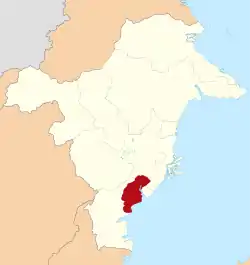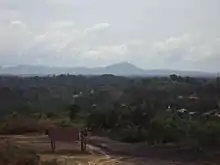Penajam North Paser Regency
Penajam North Paser Regency is a regency (kabupaten) located in East Kalimantan province in Indonesia. Its capital city is Penajam. Penajam-North Paser was part of Paser Regency until its separation in the year 2002.[1] It covers an area of 3,333.06 km2 and according to the latest official estimate (as of January 2014) it has 165,552 inhabitants.[2] Penajam-North Paser Regency has the seventh largest area among the regencies in East Kalimantan province.
Penajam North Paser Regency
Kabupaten Penajam Paser Utara | |
|---|---|
 Regent office building | |
 Coat of arms | |
 Location within East Kalimantan | |
 Penajam North Paser Regency Location in Kalimantan and Indonesia  Penajam North Paser Regency Penajam North Paser Regency (Indonesia) | |
| Coordinates: 1.291709°S 116.513796°E | |
| Country | Indonesia |
| Province | East Kalimantan |
| Capital | Penajam |
| Government | |
| • Regent | Abdul Gafur Mas'ud |
| • Vice Regent | Hamdam |
| Area | |
| • Total | 3,333.06 km2 (1,286.90 sq mi) |
| Elevation | 0 m (0 ft) |
| Population (2014 estimate) | |
| • Total | 165,552 |
| • Density | 50/km2 (130/sq mi) |
| Time zone | UTC+8 (ICST) |
| Area code | (+62) 542/543 |
| Website | penajamkab.go.id |
History and etymology
Before 2002, the area was considered to be the northern part of Paser Regency (then named Pasir Regency because of a common mispronunciation). Initiatives calling for the formation of a North Paser Regency were solidified in the establishment of the North Region Success Team Towards Regency (Indonesian: Tim Sukses Wilayah Utara Menuju Kabupaten). Penajam, the most populous town in the region, was also included in the name as the proposal developed. In 2002, The National Lower House passed Law Number 7, bringing about the formation of the Penajam-North Paser Regency (Indonesian: Pembentukan Kabupaten Penajam Paser Utara), which consists of the Penajam, Waru, Babulu, and Sepaku districts.
Boundaries
- North : Kutai Kartanegara Regency
- East : Makassar Strait and Balikpapan City
- South : Paser Regency
- West : Paser Regency and West Kutai Regency
Economic
Penajam-North Paser Regency's major commodities are palm oil and timber. Palm oil and timber make up over 70% of its economy and account for the majority of local jobs. Other major economic activities include coal mining, rice, fishing, and harvesting. These activities supply the local and Balikpapan city markets with goods like fruits, eggs, chickens, seaweed, and fish. Economic development is slowed by inadequate roads coupled with high population density. Because Penjam-North Paser Regency currently has no shopping mall, people must cross the sea via kelotok (a medium wooden boat or ferry) to go to Balikpapan for shopping. A sea bridge between Penajam-North Paser Regency and Balikpapan City is now under construction.
Population
Penajam-North Paser Regency is divided into four districts (kecamatan),[3] tabulated below with their areas and their 2010 Census populations:[4]
| Name | Area in km2 | Population Census 2010 |
|---|---|---|
| Babulu | 388.7 | 29,434 |
| Waru | 569.2 | 15,642 |
| Penajam | 1,163.1 | 66,983 |
| Sepaku | 1,129.3 | 30,863 |
Government and politics
Penajam-North Paser Regency is ruled by Regent Abdul Gafur Mas'ud. The highest local political body is the Regional People's Representative Council (Dewan Perwakilan Rakyat Daerah) which makes political, economical and other decisions for the sake of the region. On 26 August 2019, the Indonesian President, Joko Widodo, announced that part of the regency will be taken for the country's capital.
Military
Penajam-North Paser Regency is under the jurisdiction of Military District Command 0913 Penajam-North Paser of Military Area Command V Mulawarman, and Police District Penajam-North Paser under the Police Area Eastern Borneo province. Under the Soeharto Dictatorship, the area was controlled and secured mostly by the Military until the Indonesian National Police were separated from the Indonesian Armed Forces. In some circumstances, the military exercises were placed in Penajam-North Paser Regency for survival training, jungle warfare, and anti-terrorism activities, because the area is mostly virgin forest and it serves well as a military training field.
Geography
Penajam-North Paser Regency is a regency in East Kalimantan province in Indonesia. Latitude: -1.7531 Longitude: 115.6024. Coordinates are 1.2917° S, 116.5138° E. Penajam-North Paser Regency covers an area of 3,333.06 km2 (1,286.90 sq mi).
Transportation
With such a large area, Penajam-North Paser Regency has only between 150 and 200 km of asphalt roads, and most roads are still unpaved. With only the protocol road covered by asphalt or cement, economic development is slow. Most people use motorcycles for transport. Angkutan umum (Angkot) can be found at the regency capital of Penajam. People mostly use buses, modified mini pick-up trucks, and other modified trucks for mass transport. For example, a modified Isuzu Truck can hold up to 60 people workers, and modified Suzuki Carry trucks can transport up to 16 students from their villages to their school.
For sea transport, there are ferries, speed boats, medium-sized wooden boats up to 17 metres in length, and longer heavy wooden boats up to 35 metres in length, which using single propeller engines.
Tourism
Thousands Flowers Park
The Thousand Flowers Park or "Taman Seribu Bunga" is beside the Police District Station at Penajam.[5]
Beach tourism

Three beaches attract tourists. These are Pantai Lango (Lango Beach), Pantai Lawe-Lawe (Lawe-Lawe Beach), and Pantai Senipah (Senipah Beach). Senipah Beach has views of Balikpapan City and Makassar's Strait.
Waterfalls
In Riko, there's a waterfall for tourism and there's another two waterfalls, one near ex. PT International Timber Corporation Indonesia area, and another deep to the jungle from Sepaku. Its location is kept secret by local people to secure the waterfall's protection from the effects of tourism.
Hiking
In Sepaku, there's a high mountain named "Parung" for local hiking and camping. Mount Parung is a mountain upper another mountain that can be seen 50 km away and there's a big Cave for Bats and Swallow Nest and pre-Historic giant stone formation at the peaks of Mount Parung.
Deer conservation
In Api-api Village, Waru District there are endemic sambar deer (Cervus unicolor) conservation with more than 200 deer.[6]
Natural disasters
On Monday, September 7, 2020 the area began to flood to catastrophic levels.[7]
References
- "Website Pemerintah Kabupaten Penajam Paser Utara – Maju, Modern dan Religius". Retrieved 2021-01-04.
- Biro Pusat Statistik, Jakarta, 2015.
- "Website Pemerintah Kabupaten Penajam Paser Utara – Maju, Modern dan Religius". Retrieved 2021-01-04.
- Biro Pusat Statistik, Jakarta, 2011.
- "Insight of Penjam".
- Endri Kurniawati (August 19, 2014). "A Walk to Penajam Deer Conservation".
- "Indonesia, Flooding in Penajam Paser Utara Regency, East Kalimantan Province (10:55 Sep 8 2020) - Indonesia". ReliefWeb. Retrieved 2020-12-22.